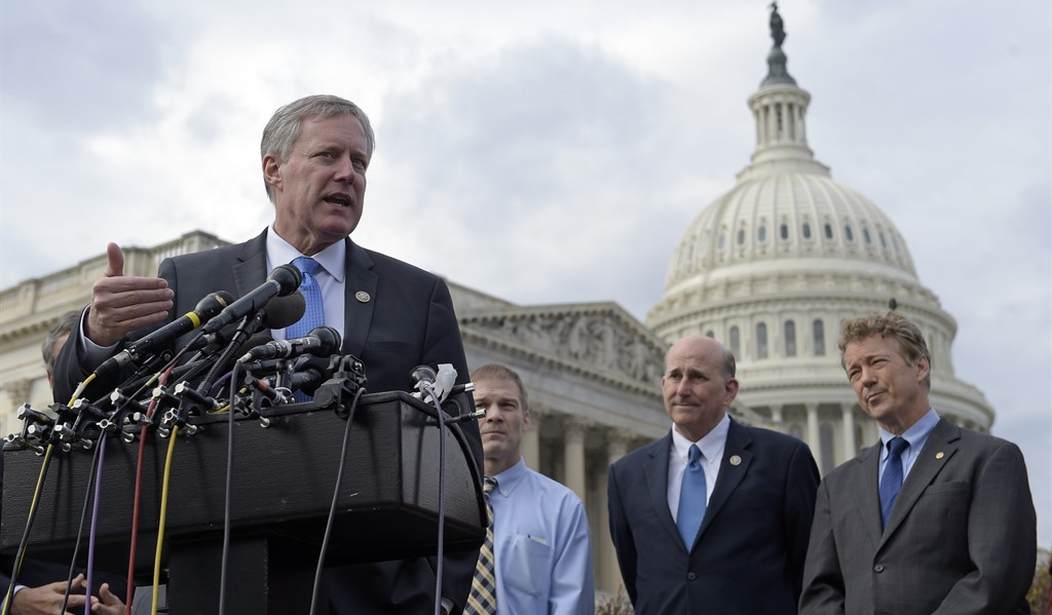Top leadership sources on Capitol Hill warn that it's premature to call this a "breakthrough" because (a) the rumored compromise hasn't been agreed upon by the relevant parties, (b) there is no legislative language to reflect its potential content at this point, and (c) the full GOP conference has yet to discuss it -- though it will likely come up at length during an already-planned conference call this weekend. The overall message seems to be, "there has been significant progress, but everyone hold your horses for now." It's almost as if senior Republicans aren't eager to raise expectations or erect any empty deadlines for some reason. The Trump White House is reportedly urging the House to hold a vote on whatever plan emerges next week, but based on conversations I've had this afternoon, this feels roughly accurate:
I am sensing HEAVY SKEPTICISM from senior House Republicans about a vote next week. And I'm putting that mildly.
— Jake Sherman (@JakeSherman) April 20, 2017
Setting aside questions of timing and logistical X's and O's, the policy rumblings indicate that a new bill would be a modified variation of the original American Health Care Act (AHCA), with most of its core provisions intact. It's unclear how many of the eleventh-hour additions that discussed as tacked-ons to the legislation during the last, failed legislative push will carry over to the new bill. Here is the core of the would-be bargain, which centers around the option for states to seek waivers to some of Obamacare's mandates and regulations:
The deal — brokered by centrist Tuesday Group co-chair Tom MacArthur of New Jersey and hard-right Freedom Caucus head Mark Meadows of North Carolina — proposes giving states more flexibility to opt out of major Obamacare provisions, while preserving popular protections like the law’s ban on discrimination against people with pre-existing conditions...the latest proposal would allow states to apply for "limited waivers" that would undermine Obamacare's protections for pre-existing conditions. Under these waivers, states could opt out of Obamacare standards setting minimum benefits that health plans must offer and a requirement — called community rating — forbidding insurers from charging different prices to people based on health status. Both are provisions that the GOP’s ultraconservatives have pushed to eliminate as part of the repeal effort, contending that these coverage mandates drive up the cost of insurance. States opting out of the community rating rules would be forced to set up separate insurance pools, known as high-risk pools, where people priced out of the private market could purchase coverage. At the same time, the deal would allow states the option of maintaining insurance protections, supported by centrist Republicans, including community rating. MacArthur said in a statement Thursday that he has insisted during the discussions that any compromise have protections for pre-existing conditions.
Recommended
So states would be able to ask the federal government for exemptions to current top-down federal requirements on "essential health benefits" and the so-called "community rating" mandate under which insurers are barred from charging patients with pre-existing conditions higher rates than healthier consumers. In order to be granted waivers, states would be required to demonstrate that they are pursing them in the interest of lowering costs or increasing coverage. They would also be required to help protect sicker citizens with pre-existing conditions who may find themselves priced out of the general market either by setting up and subsidizing a state-level "high risk pool," or participating in a federal one. The original AHCA allocated about $100 billion for this purpose, and an additional $15 billion stabilization fund has been floated to help provide more immediate relief.
Supporters of these waivers would argue that each state would have the flexibility to pursue the best option for their residents, and that burdening insurers with fewer costly mandates will guarantee lower premiums and an increased array of choices for many. Two of Obamacare's fundamental flaws are relentlessly rising rates and severely contracting coverage options, which go hand in hand, and are getting worse. Critics of the idea object that scaling back EHBs would result in less comprehensive plans for too many people, and that while people with pre-existing conditions would technically be protected, the potential scrubbing of "community rating" regulations in some states could make coverage totally unaffordable for that population. That's why high risk pools are such a critical component of the GOP idea.
Politically, Democrats will argue that the new bill is worse than the original TrumpCare because of "reduced protections" that may hang patients with pre-existing conditions out to dry. Republicans would need to credibly counter that the high risk pools are adequate mechanisms to solve that market failure while arguing that flexibility on the comprehensiveness of plans will provide younger and healthier Americans will have more and cheaper options than exist under the sputtering status quo. Will the GOP manage to unify behind this compromise, if it's finally reached? Keep a close eye on the moderates especially. If the infighting subsides, will they be able to sell the bill to a skeptical public? And when could they realistically pull this together for a floor vote? I'll leave you with Paul Ryan's framing of the current process:
Paul Ryan said yesterday “finishing touches" on Obamacare bill; White House says they're working "non-stop" w team.https://t.co/jzd8FCQUuU https://t.co/kAiQMdPhRY
— Jennifer Jacobs (@JenniferJJacobs) April 20, 2017

























Join the conversation as a VIP Member